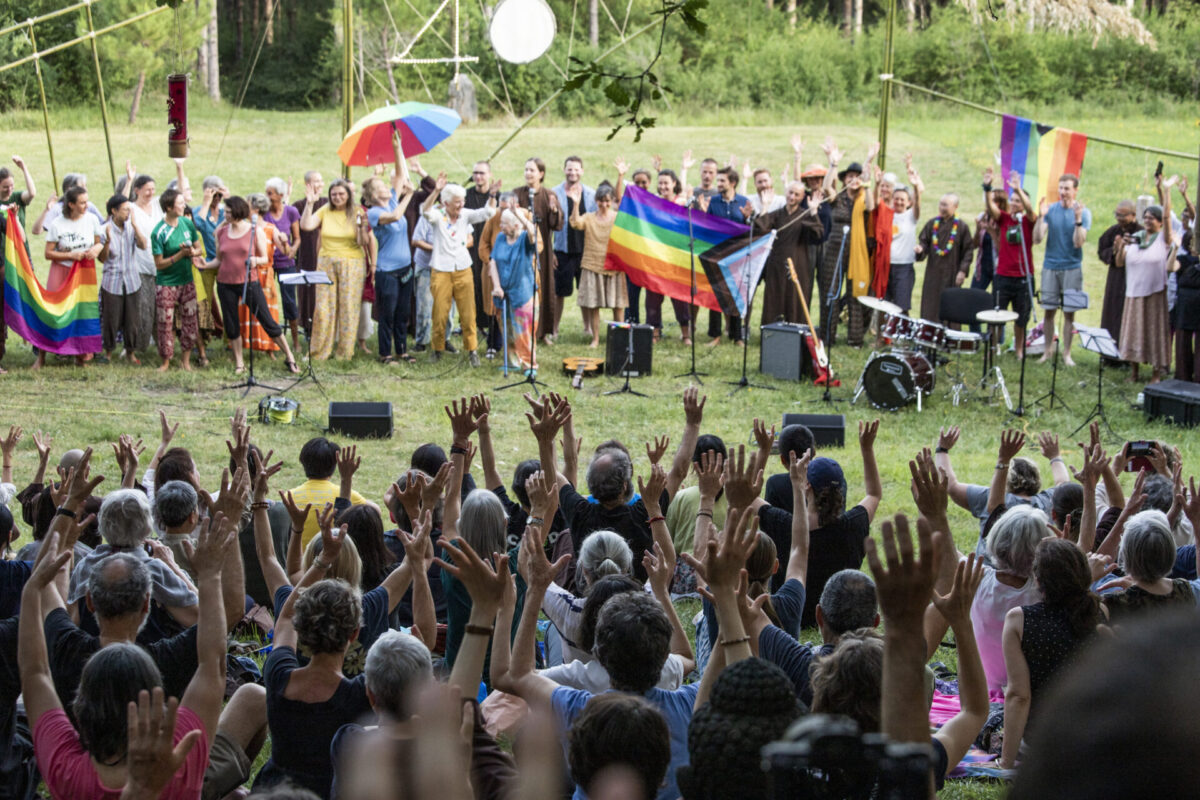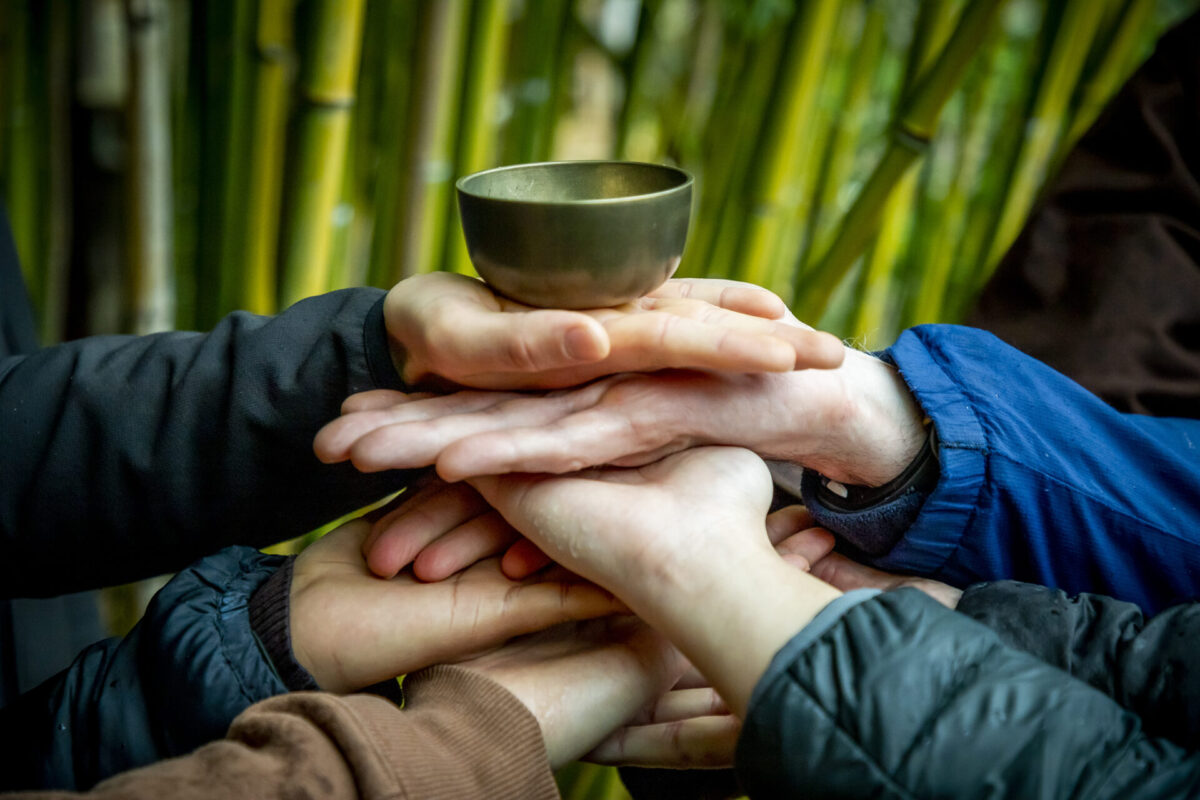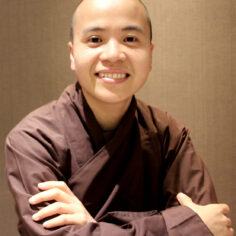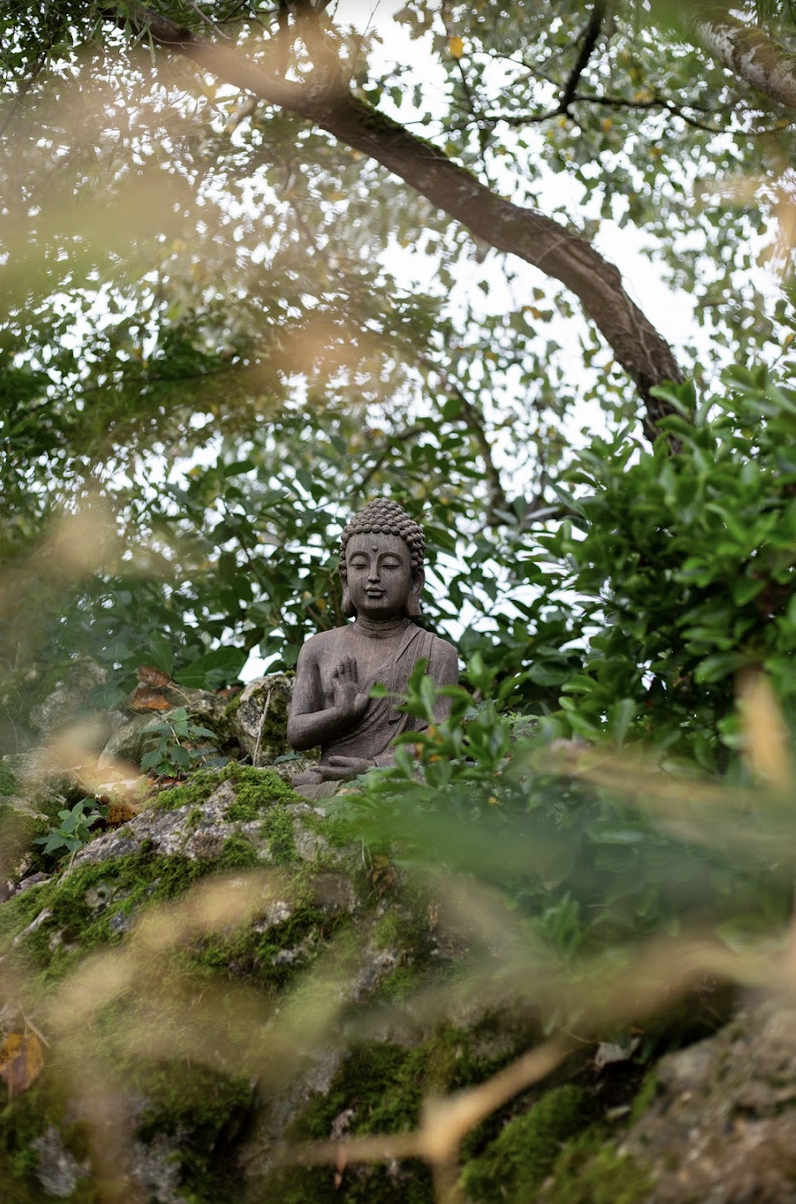Understanding relationships and suffering in the LGBTQIA+ community
By Sister Bội Nghiêm on
Dear beloved community, my name is Sister Bội Nghiêm and my pronouns are she, her, and hers. It is a great joy for me to share with you my practice. This is an opportunity for me to practice being humble, being honest, and at the same time being vulnerable.
Understanding relationships and suffering in the LGBTQIA+ community
By Sister Bội Nghiêm on
Dear beloved community, my name is Sister Bội Nghiêm and my pronouns are she, her, and hers. It is a great joy for me to share with you my practice. This is an opportunity for me to practice being humble, being honest, and at the same time being vulnerable. Dharma teachers not only want to share about the fruits of our practice, but also share the difficulties, the challenges that we are currently having. I hope that through this honesty, this authenticity—keeping things real!—we are able to connect on a more personal level.
What is a relationship?
So, in preparing for this Dharma talk on relationships, I took refuge in Google.com, my monastic siblings, and also friends in the LGBTQIA+ community. When we talk about relationships, what comes to mind? Are relationships to do with the people whom we are close to, or with our own thoughts? Is it the relationship we have with ourselves? Is it with Mother Nature?
As a member of the Plum Village community, I want to understand, to help, to heal, and to be open to learn.
If English is our first language, there are some words that we’ve known since we were very young. We don’t bother to look them up in the dictionary because we believe they are simple words, and there is nothing special about them. But today I want to invite you to change your way of thinking and to look up familiar words in the dictionary, and to ask yourself, “Was my understanding correct?” “Am I caught in what I know?” Not wanting to be so confident in my understanding of the word “relationship,” I went online searching for its meaning on etymology.com. Do you know the word “relationship” first appeared in 1735 to 1745 and it wasn’t until 1944 that it specifically implied romantic and sexual relationships? So, for two centuries the word “relationship” basically was meant to apply to blood or marriage relatives or kinship.
Now let us dig deeper into the history, the origin, and the true meaning of “relationship.” It is the way in which two or more concepts, objects, or people are connected. The part I want all of us to focus on is the word “connected.” The second meaning can be a strong, deep, or close association or acquaintance between two or more people. I would like to underline the words “strong,” “deep,” and “close.” When we talk about relationships, we talk about connections—connection between two or more people. But as you know, language changes over time because our way of thinking changes over time. In the year 2021, when we talk about relationships, we don’t just focus on people, but we can also focus on Mother Earth, oneself, and our own thoughts.

Today in my Dharma talk, I want to focus on four kinds of relationships. The first one is our relationship with our own thoughts; second, our relationship with family members; third, our relationship with romantic love. May I see a show of hands of who is in love right now, in a romantic relationship? For those of you who are not, I like to see that you are smiling. You are in love with the present moment; you are in love with yourself. I am not in a romantic relationship, but I am in many other relationships. The fourth is relationship with oneself. Whom do we spend the most time with in our lives? Who will lie next to us in our coffin? Our own self. This is a very important relationship on which I will elaborate later on.
Do you know that the word “relate” means to restore, bring back? It can also mean make last, solidify, strengthen, repay, and one interesting meaning: give up. Isn’t that interesting? The word “relate” also means give up. So “relate” means to make lasting, to suffer without breaking, to maintain, and to surrender or let go. Take a moment and ask yourself, are you able to restore, bring back, make last, solidify, strengthen, and repay in your relationships? For those of you who are interested in studying the brain and neuroscience, perhaps you know we produce 98,000 thoughts every day and these thoughts are repetitive day after day. If we know the practice of mindfulness, we can transform some of these thoughts; but if we do not know the practice, we can easily drown ourselves in these thoughts.
“What can I do better right now and tomorrow so that I don’t create more suffering?”
Understanding LGBTQIA+ suffering
I want to dedicate this first part of the Dharma talk to the LGBTQIA+ community. In the past few weeks, my sister and I took some of our personal time to speak to our LGBTQIA+ friends to learn more about you. I want to understand your struggles so that I, and many others, do not make the same mistakes I made in the past. Our society has hurt you enough; your loved ones have harmed you enough. You come to the Plum Village tradition to find peace, love, and refuge. And if I, myself, don’t understand your suffering because of my insensitivity, if because of my unskillfulness I say words that hurt you, then you lose hope and faith; you may think there is no place for you anywhere in the world. As a member of the Plum Village community, I want to understand, to help, to heal, and to be open to learn.
I know you have been through much pain and suffering. Imagine being born, growing up, and identifying yourself as lesbian, gay, bisexual, transgender, queer, questioning, intersex, or asexual; some psychiatrists, psychoanalysts, religious leaders, teachers, and family members may conclude you have mental illness. How many of us know the real struggles our LGBTQIA+ friends had endured? I really want us to open our hearts, open our minds to learn from these friends, and to listen to their stories. Research papers back in the 1970s, the 1960s, and way before that concluded the LGBTQIA+ friends have a mental illness, a mental disorder. As individuals who do not identify as LGBTQIA+, when is it our turn to change our way of thinking toward marginalized groups? If not now, then when?

June is LGBTQIA+ Pride month. As mindfulness practitioners, we can seize this opportunity to learn. Openness is one of The Fourteen Mindfulness Trainings that we are invited to practice in our daily lives; non-attachment to views is another. I want to share with you some facts, not with the intention to make our LGBTQIA+ community suffer more, but to raise the awareness in our community of what happened in the past. My own thoughts, my own narrowness, my own ignorance existed for many years.
Dear beloved community, did you know that it wasn’t until 1973 that the American Psychiatric Association removed the diagnosis of homosexuality from the second edition of its Diagnostic and Statistical Manual? They had certain theories about homosexuality. The first one was the theory of pathology. They believed that adult homosexuality was a disease. And they viewed homosexuality as a defect, or even morally bad—a social evil. There was a psychiatrist and psychoanalyst named Edmund Bergler, who infamously wrote in a book for a general audience, “I have no bias against homosexuals, for me they are sick people requiring medical help.” How do we feel when we listen to this kind of statement? I am sure there is compassion in your heart. Here you see the importance of our thoughts because, if we are adamant in believing our thought is right, once we put it down on paper others will read it and they will believe it, live by it, and make others suffer. For young people sitting here, I am looking at you—future psychiatrists, future doctors, future social workers, future healers. This generation has to be different. We can do much better than the past generations. When we know someone who identifies as LGBTQIA+, we can say silently to ourselves, “This person is a Buddha-to-be and has this awakening nature. All this person wants and needs is peace and happiness and to honor their sexual orientation and gender identity.” One gay friend put it so beautifully: gender is not an obstacle to enlightenment. He is the true continuation of the Buddha, because I am sure the Buddha once said the same when he allowed the nuns to join the monastic community. He was able to see that the nuns can also attain enlightenment, just as the monks do. For me the Buddha is the first and earliest revolutionary spiritual teacher in history. I may be wrong.
Day by day we continue to learn and to create a monastery that is safe for you, so you can really feel at home and feel included.
A few years ago we had a lesbian friend who asked permission to come stay at the monastery as a long-term resident. When I heard her request I was very afraid and worried. What happens if this lesbian friend falls in love with one of the sisters? Would I feel safe around her? She hadn’t arrived yet, and yet I was, sitting there thinking she might be a threat to the community and my own practice because of her sexual orientation. When she came, I was hesitant at first, but then I listened to her stories of why she chose to come to Magnolia Grove Monastery in Mississippi to practice. My view about her changed right away. She was in the midst of wanting to end her life, because she had suffered so much; she had just had a breakup with her girlfriend. How could I see that person as a threat when I was able to see the pure intention of her wish to come to the monastery to practice? After getting to know her, I saw her as a compassionate person, as someone who was very kind and loving, who would always be there to help the sisters when we needed her to help. After she left, I didn’t remember her as a lesbian friend only, but as a caring person, someone who wants to live this life. So, meeting her was a teaching to me to be careful with my own thoughts, especially thoughts that are biased and detrimental.
Thinking itself is an action. If we are not mindful enough, we say harmful things out loud. We create wounds in people’s hearts that could take them many years to transform. Don’t sit there and blame that person, asking, “Why is it taking you so long to transform your wounds?” We should ask ourselves, “What can I do better right now and tomorrow so that I don’t create more suffering?”
I know there are family members out there who sing with joy, and happiness fills their heart when their loved one says, “I am gay,” “I am lesbian.” They respond, “Yay! You are finally coming out!” We do have grandparents, parents, relatives who are like that, and this gives me hope. Before, if somebody came to me and said, “Sister Bội Nghiêm, I am a lesbian,” “I am gay,” “I am trans,” I would react, and say with surprise, “Oh!” Why? Because I was surrounded by people who had certain perceptions about these friends, and it affected me. But now I want to be different. I want to be grateful when they come to me and share their identity, because I know they trust me, they feel comfortable with me, they feel safe. And I am sure there are many monastic siblings sitting here who have the good fortune to be in the presence of friends who open their hearts and share with us. These stories helped me to change my view, my thinking, and if you have a trace of discrimination, I hope they also help you to change your thinking.
The Third of the Five Mindfulness Trainings: True Love Aware of the suffering caused by sexual misconduct, I am committed to cultivating responsibility and learning ways to protect the safety and integrity of individuals, couples, families, and society. Knowing that sexual desire is not love, and that sexual activity motivated by craving always harms myself as well as others, I am determined not to engage in sexual relations without mutual consent, true love, and a deep, long-term commitment. I resolve to find spiritual support for the integrity of my relationship from family members, friends, and Sangha with whom there is support and trust. I will do everything in my power to protect children from sexual abuse and to prevent couples and families from being broken by sexual misconduct. Seeing that body and mind are interrelated, I am committed to learning appropriate ways to take care of my sexual energy and to cultivating the four basic elements of true love—loving kindness, compassion, joy, and inclusiveness—for the greater happiness of myself and others. Recognizing the diversity of human experience, I am committed not to discriminate against any form of gender identity or sexual orientation. Practicing true love, we know that we will continue beautifully into the future.
Getting the water
I want to end this part by sharing something from a lay Dharma teacher in the Plum Village community who is a lesbian. She is now seventy-one years old. She said when it comes to gender identity and social acceptance, during her generation, they drilled the well but didn’t strike the water yet. Young people these days are getting the water. You are getting the water. So, just to say it again, gender identity and sexual orientation are not obstacles to enlightenment. When a friend comes and shares about their gender identity and sexual orientation, some of us will have the tendency to ask, “Are you sure? Do you ever want to be ‘normal’ again?” But do we know statements like that are not helpful? Do we know we were trained to think in certain ways? So when is it our turn to change our thoughts? If not now, then when?
To all the LGBTQIA+ friends out there, please know, I’ve got your back, and I am sure there are many monastics who have got your back. Day by day we continue to learn and to create a monastery that is safe for you, so you can really feel at home and feel included. We know you want to have an interpersonal relationship with us, with the people you come in contact with. And we can only do that when we feel connected in relationship with you.
This is an excerpt from Sister Bội Nghiêm’s Dharma talk from the Wake Up Earth Retreat, May 28, 2021, at Magnolia Grove Monastery, Batesville, Mississippi, USA. The complete Dharma talk can be found on the Deer Park Monastery YouTube channel. Transcribed by Giovanna Zerbi. Edited by Jane Ellen Combelic, Hisae Matsuda, and Brother Pháp Lưu.


